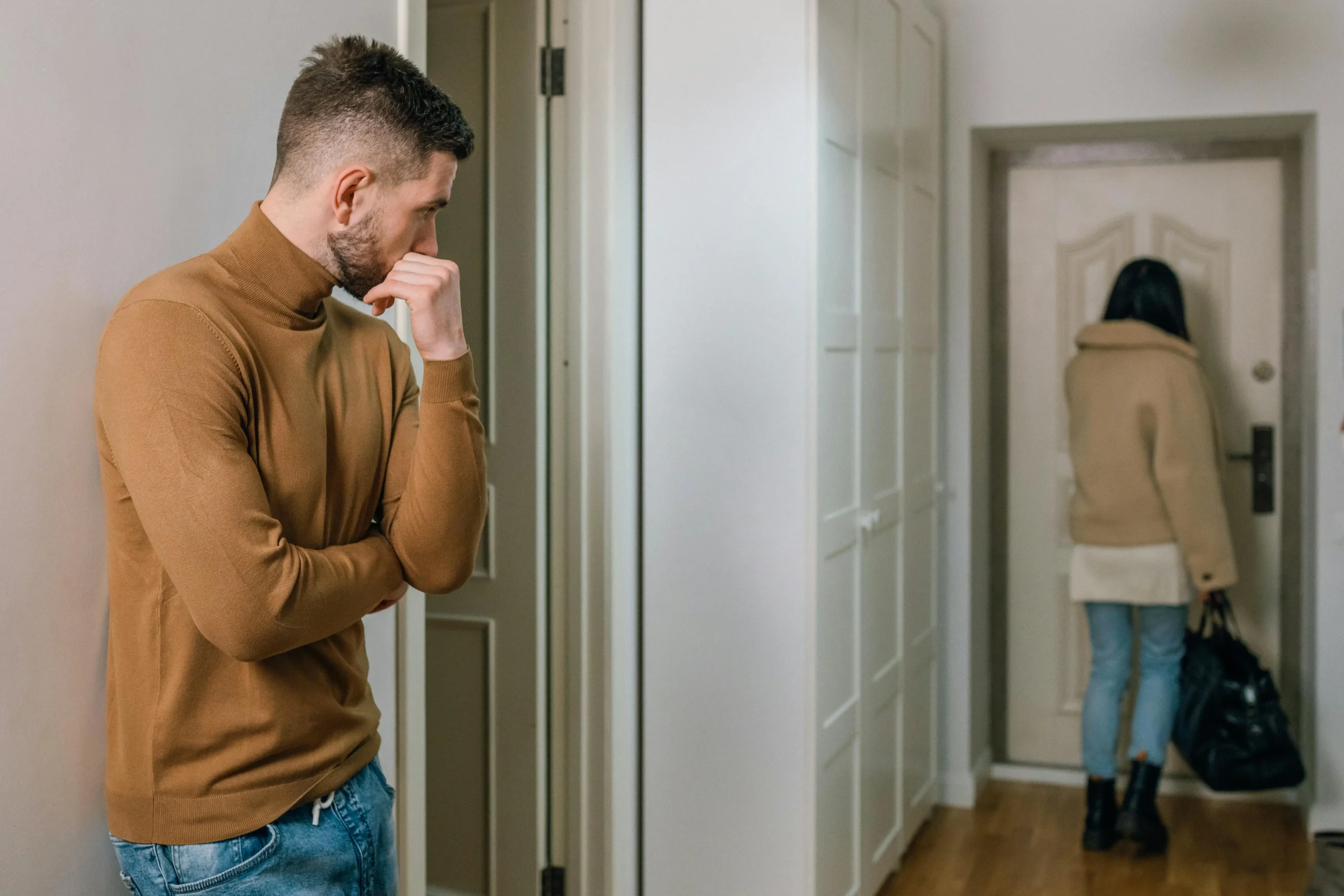Introduction: When Relationships End, So Much More Ends With Them
When relationships end, it often feels like the ground beneath you has cracked open. I still remember that feeling—the shock, the silence, and the overwhelming ache that made it hard to breathe. It wasn’t just about losing a partner; it was about losing the shared memories, the routines, and the version of myself that only existed within that relationship.
Whether it was mutual or messy, slow or sudden, when relationships end, the emotional impact is deeply personal. You may find yourself questioning everything—your worth, your future, and even your ability to love again. I’ve been there, and if you’re here now, I want you to know: healing is possible.
This blog isn’t just another list of tips. It’s a deeply human guide that blends psychological insight, real-world experience, and practical strategies. We’ll explore how to cope when a relationship ends, understand the emotional stages you might go through, and slowly work toward rediscovering the version of yourself that feels whole again.
If you’re ready to process, reflect, and rebuild—let’s walk this path together.
Understanding the Emotional Impact When Relationships End
The Psychological Effects of When Relationships End
Let’s start with the truth: when relationships end, the emotional fallout is often underestimated. We live in a world that rushes us to “just get over it,” but the reality is, breakups affect us deeply—physically, mentally, emotionally.
You may feel a chaotic mix of sadness, anger, guilt, relief, and fear. These reactions aren’t random; they’re rooted in how humans form emotional attachments. Studies have shown that breakups activate the same neurological pathways as physical pain. It’s no wonder that it hurts this much.
Beyond the pain, there’s also disorientation. You may lose not just your partner but also your emotional anchor, daily structure, and future narrative. This loss can cause anxiety, depression, and a deep erosion of self-worth—especially when a relationship ends suddenly or involves betrayal. For some, this pain leads to social withdrawal, sleeplessness, difficulty concentrating, or even physical illness.
But here’s what I want you to know: these feelings are valid. You’re not being “too sensitive” or “dramatic.” You’re grieving a life you once knew. And acknowledging that is the first step toward real healing.
According to a study published by the National Library of Medicine, breakups significantly increase depression, anxiety, and decreased self‑worth—especially following sudden or unexpected separations.
The Grieving Process When Relationships End
Grief isn’t reserved for death. When relationships end, we grieve too—because something meaningful is lost. And just like mourning, relationship grief comes in waves and stages.
Psychologists have mapped this process through six broad emotional stages:
- Denial: “This can’t be happening.”
- Anger: “Why did they do this to me?”
- Bargaining: “Maybe if I had just tried harder…”
- Sadness: The heavy, heartbreaking realization of the end.
- Acceptance: Understanding that it’s over.
- Rebuilding: The hopeful steps toward starting again.
Here’s the catch: it’s not a straight path. You might feel acceptance one day, and deep sorrow the next. That’s okay. Healing is messy, and grief doesn’t follow a calendar. The emotional stages of a breakup are deeply personal, and no two journeys are the same.
Instead of fighting it, let yourself move through the process. Cry when you need to. Be still when you can’t move. And when you feel even the tiniest spark of hope—follow it.
Because with time, grace, and the right tools, when relationships end, they don’t have to end you.
The Path to Healing When Relationships End
Acknowledge and Validate Your Emotions
Healing truly begins the moment we stop pretending everything is fine. When relationships end, the emotional turbulence that follows can feel like a tidal wave—anger, sadness, confusion, guilt, even relief, all crashing in at once.
Rather than pushing those feelings down, give them space. Cry if you need to. Write freely in a journal. Talk out loud to yourself, a friend, or a therapist. These aren’t signs of weakness—they’re emotional tools. Naming your emotions gives you power over them. The pain doesn’t disappear, but it becomes more manageable. And over time, those raw edges begin to soften.
As I learned personally, one of the healthiest things you can do when a relationship ends is to stop judging how you feel and start honoring it.
Practice Self-Care and Self-Compassion
In the aftermath of heartbreak, self-care is survival—not selfishness. Take a moment to ask yourself: What would I offer a friend going through this? Then turn that same kindness inward.
Take walks. Drink water. Play your favorite music. Let sunlight hit your face. And on the days when all you can do is breathe—breathe slowly, but stay.
Also, be gentle with the emotional parts of you. When relationships end, it’s natural to feel regret or blame yourself. But healing demands self-compassion. It reminds you that feeling attached to someone, even if the relationship was unhealthy, is a deeply human experience.
The American Psychological Association reports that structured interventions—like writing about emotions and connecting with trusted peers—can significantly ease emotional distress after a breakup.
Establish Healthy Boundaries When Relationships End
Let me say this clearly: You owe no one constant access to your emotional world—especially not your ex.
When relationships end, maintaining contact often delays healing. The occasional “just checking in” text or constant scrolling through their social media feeds can reopen emotional wounds that were just beginning to scab over.
Creating healthy boundaries—physically, digitally, and emotionally—protects your space to heal. Delete their number. Unfollow them for now. Remove reminders from your room or phone. This isn’t pettiness; it’s protection.
Limiting contact is one of the most effective ways to let go and reclaim your energy.
Stick to a Routine for Stability
Everything may feel out of control when relationships end, but routine gives your brain a sense of safety and rhythm.
Start small: wake up at the same time every day, drink coffee or tea in peace, do light exercise, or read a chapter of a book. These daily anchors give structure to your days and allow your nervous system to gradually calm down.
With time, structure helps rebuild your confidence. And little by little, life starts to feel less like survival and more like living again.

Seek Support: You Don’t Have to Do This Alone
Breakups can make you want to isolate—but isolation is where emotional pain festers.
Reach out. Talk to a close friend who won’t just give advice, but will listen. Let family remind you of who you were before this relationship. And if the pain feels too heavy to carry, therapy can be life-changing. It was for me.
When relationships end, mental health support isn’t a luxury—it’s a lifeline. Therapists can help you identify patterns, reframe your narrative, and find yourself again after a relationship ends.
Avoid Unhealthy Coping Mechanisms
It’s tempting to numb the pain. Maybe it’s another drink. Or a rebound text. Or binge-watching until 3 AM so you don’t have to think.
I get it. But the truth is, when relationships end, avoiding pain only postpones it. And the longer you avoid it, the harder it hits later.
Try healthy outlets instead—walks, painting, dance, breathwork. Express what’s inside rather than suppress it. Creative pursuits, physical activity, and mindfulness help convert raw pain into something powerful.
Reflect and Learn From the Experience
Pain without reflection is just suffering. But when relationships end, you’re given an opportunity to step back and truly understand yourself.
Ask: What did I need that I didn’t get? What signs did I ignore? What boundary did I cross for love? This isn’t about shame—it’s about self-discovery.
This reflection helps prevent repeating painful patterns. It also sets a foundation for healthier, stronger future relationships—built on clarity, not confusion.
Read my blog on healing after a breakup.
Letting Go: The Art of Release When Relationships End
Why Letting Go Is So Hard When Relationships End
Letting go isn’t forgetting. And it definitely doesn’t mean you’re over it overnight.
One of the biggest myths when relationships end is that if you still miss them, you must still love them—or want them back. But grief and love are complicated. Emotional attachment can exist even long after the relationship stopped serving you.
You can mourn someone and still know they weren’t right for you. You can cry over the memories and still move forward. That’s not a contradiction—it’s the truth.
Letting go is less about cutting someone out of your mind and more about releasing the belief that your happiness depends on them.
Practical Steps to Letting Go When Relationships End
Letting go requires both emotional and physical actions. Here are practical ways to begin:
- Limit contact—remove their number, mute their posts, or block if needed
- Create new routines—replace old habits with ones that are yours alone
- Focus on your growth—invest in yourself, take classes, travel, reconnect with your passions
- Forgive—not for them, but for you. Forgiveness is a powerful release. It doesn’t excuse the past—it just sets you free from carrying it
When you take these steps with intention, you stop defining yourself by what you lost and start recognizing what you still have—and what you’re capable of becoming.

Starting Again: Rebuilding Your Life When Relationships End
Reconnecting with Yourself When Relationships End
There’s a strange silence when relationships end—and in that quiet, a question often whispers: Who am I now?
It’s okay if you don’t have the answer right away. Many of us lose parts of ourselves in long relationships—our routines, passions, even our sense of independence. But this is also your chance to come home to yourself.
Try things you used to love. Return to the hobbies you left behind. Pick up a new skill, take that solo trip, or start journaling again. This isn’t just about distraction—it’s about rediscovery.
How to find yourself again after a relationship ends isn’t a single step—it’s a series of gentle actions, each one bringing you closer to the you that existed before, and the version of you waiting to emerge now.
Rebuilding Self-Esteem When Relationships End
When relationships end, self-worth often takes a brutal hit. You might start believing the breakup means you’re not enough, or worse, that you’re unlovable.
But that voice in your head? It’s not true. It’s trauma echoing back at you.
Start by interrupting that narrative. Replace harsh self-talk with gentle truths. You are enough. You did your best. You deserve love again.
Create small daily rituals: list three things you’re proud of each night. Say something kind to yourself every morning. These affirmations aren’t cheesy—they’re rewiring the way you see yourself.
Rebuilding self-esteem isn’t vanity. It’s healing.
Opening Up to New Possibilities After a Breakup
Here’s something beautiful: when relationships end, they don’t just close doors—they open new ones.
You’ll know you’re healing when the ache starts to fade. When you smile at memories instead of crying. When your thoughts slowly shift from “Why me?” to “What’s next?”
That’s when you’re ready to let a little hope in.
You don’t need to rush into dating. In fact, you don’t have to date at all. But be open—to new friends, new projects, new chapters. Allow yourself to feel curious again. A little excitement is a good sign.
These are the signs your relationship is really over—in the healthiest way. The pain may not vanish, but it will stop controlling you. And that freedom? That’s everything.
Seek Professional Help When Relationships End
Sometimes, no matter what we try, the weight doesn’t lift.
When relationships end, it’s normal to grieve. But if you find yourself stuck—crying daily for weeks, obsessing over your ex, feeling hopeless or numb—these could be signs that you need help.
There is no shame in asking for support. Therapy helped me untangle thoughts I didn’t even know I had. It gave me the tools to move forward when I couldn’t do it alone.
Please remember: your pain is valid, but it doesn’t have to be permanent. A professional can walk with you, offering both tools and hope.
Don’t wait until it gets worse. You deserve to feel whole again.
Conclusion: Your Ending Is a New Beginning
It’s okay to admit it, when relationships end, it can feel like your world just collapsed.
But endings aren’t just painful. They’re powerful.
They strip away the illusions. They clarify what matters. They crack you open just enough for something new to take root. This is the part most people don’t tell you: heartbreak can be the beginning of your greatest transformation.
You are not broken. You are becoming.
Let yourself grieve, heal, and rediscover your own voice. Let yourself grow without apology. Because one day—maybe soon, maybe not—you’ll look back and realize this ending was the beginning you never saw coming.
And you’ll be proud. Not because you never hurt—but because you kept going.

Frequently Asked Questions: What to Do When Relationships End?
Q1. What should I do first when a relationship ends?
A. The first step is to acknowledge and validate your emotions. It’s okay to feel overwhelmed, angry, or confused. Let yourself grieve without judgment—journaling, crying, or talking it out with someone you trust can help begin the healing process.
Q2. How long does it take to heal after a relationship ends?
A. There’s no fixed timeline. Healing depends on the length of the relationship, emotional depth, and personal coping tools. For some, it’s weeks; for others, it’s months. What matters is allowing yourself to move through the stages of grief without rushing the process.
Q3. Why is it so hard to let go when relationships end?
A. Letting go is hard because emotional bonds don’t break the moment a relationship ends. Your brain and heart are still wired for connection, which makes detaching feel unnatural—even if the relationship was unhealthy. Letting go is a process, not a switch.
Q4. Is it normal to miss my ex even if the relationship was toxic?
A. Yes, it’s completely normal. Missing someone doesn’t mean you made the wrong choice. It just means you’re human. Emotional attachment can linger long after logic says it’s time to move on, especially when a deep connection is involved.
Q5. When should I seek therapy after a breakup?
A. If you’re experiencing prolonged sadness, intrusive thoughts, anxiety, or feel stuck without progress, it’s a good time to seek professional help. Therapy offers tools to understand your emotions, rebuild your self-worth, and guide you through your recovery.

